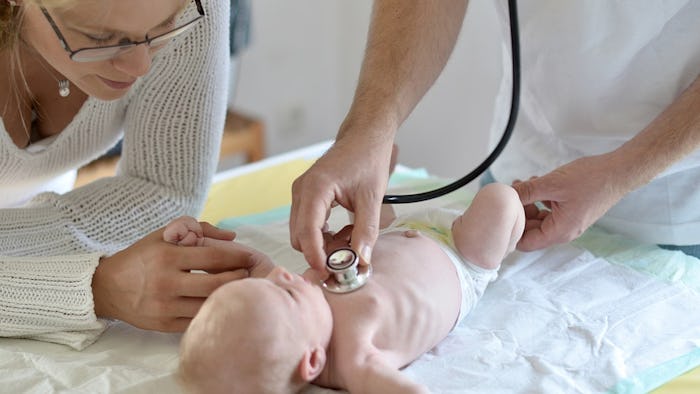Life

6 Questions To Ask A Pediatrician At The 1 Month Visit, According To An Expert
If you've never been a parent before, it's typical to feel clueless when you're face-to-face with your baby's pediatrician. And thanks to sleep deprivation, a steep learning curve, and the normal overwhelm that accompanies the newborn stage, trying to figure out what questions to ask a pediatrician at the one month visit is a substantial ask. I mean, weren't you just asking your OB-GYN and/or midwife about pregnancy?! How did this happen?!
I can tell you that, as a new mom, I felt embarrassed asking someone with a medical degree what I considered to be "stupid questions," like how to help my baby sleep through the night or if my baby's diaper rash was something more serious. I didn't want a physician judging my parenting choices, or thinking I was a dumb-dumb for not knowing the answers to what I thought were basic questions. Thankfully, the exact opposite turned out to be the case: my child's pediatrician was understanding, and provided me with a breadth of knowledge that helped me feel more confident when caring for my baby.
Romper spoke with Dr. Jessica Madden, MD, a pediatrician and neonatologist at Rainbow Babies and Children's Hospital in Cleveland, Ohio, and founder of Primrose Newborn Care — a newborn home visiting service — via email. Madden confirmed that when it comes to your newborn, there's absolutely no such thing as a stupid question, and advised new parents to to ask their baby's doctors
"Is My Baby Gaining Enough Weight?"
One of the most important purposes of well-baby visits, according to Madden, is to determine if your baby's growth is on track. "If a baby is falling off of their growth chart at the one-month visit, they need to be evaluated," she says. "We need to find out if the problem is with caloric intake — low breast milk supply, or utilization of too many calories — undiagnosed congenital heart disease, or a problem with metabolism."
Madden says that if you have concerns about breastfeeding, you should absolutely ask your pediatrician about your baby's weight. "If there are any concerns from either parents or pediatrician that baby is not eating enough or there are breastfeeding issues, these need to be addressed ASAP and appropriate plan put in place," she tells Romper. "This might include having a lactation consultant to come to the home, frequent weight checks, or a supplementing plan."
"How Much Should My Baby Be Sleeping At Night?"
Most new parents have questions about what's normal for baby sleep, says Madden. "Parents often have questions about when their babies will sleep through the night, how much sleep they need, where they should sleep, and when they should consider sleep training."
Unfortunately, per Madden, if your baby is 1 month old, sleeping through the night probably won't happen any time soon. "Most babies do not sleep through the night until they are older than 6 months of age," she says. "Pediatricians define 'sleeping through the night' as any stretch of at least six hours. So if a baby goes to bed at 10 p.m. and wakes for a 4 a.m. feed, they are sleeping through the night."
"How Often Should My Baby Eat?"
Madden says she often learns that babies are not getting enough to eat after they have a related health problem. She wishes new parents would ask her how often their baby should be eating, especially if they were born early. "Any baby who is premature (less than 37 weeks gestation) will need to eat more frequently than a full-term baby," she says. "Many of the babies we have to re-admit to the hospital for jaundice and dehydration are late preterm infants."
"When Should My Baby Be Seen For A Fever?"
Another question that frequently comes up, says Madden, is when you should call a doctor if your baby has a fever. Her advice for new parents is to call if you are in doubt, adding, "Any fever greater than or equal to 100.4 degrees Fahrenheit in a 1-month-old baby is an emergency. A febrile newborn needs to be seen by a doctor no matter the time of day or night."
"Do I Have Postpartum Depression?"
While you may be focused on your baby during their doctor's visit, Madden notes that your baby's pediatrician can play an important role in helping you with any postpartum mental health concerns you might have. "You should share if you are worried about postpartum depression, as pediatricians can help you to get evaluated and treated."
Pretty Much Anything Else
When in doubt, parents should never hesitate to ask their baby's pediatrician about anything they have on their mind. 'You should ask any and all questions you have had and what you've been worried about, even if they seem silly or minor. Their job is to answer your questions and support you," Madden tells Romper. "Follow your intuition — if you are worried about your baby or notice a change in their behavior, speak up, ask and get help."
If you or someone you know is experiencing depression or anxiety during pregnancy, or in the postpartum period, contact the Postpartum Health Alliance warmline at (888) 724-7240, or Postpartum Support International at (800) 944-4773. If you are thinking of harming yourself or your baby, get help right away by calling the National Suicide Prevention Lifeline at 1-800-273-8255, or dialing 911. For more resources, you can visit Postpartum Support International.